This project supported by Ford Foundation and Hivos was implemented in Thiruvannamalai and Dindigul districts of Tamil Nadu. The main goal of the project is to increase the income levels of farmers with a special focus on dryland areas of India through sustainable agricultural practices, inculcating strong components of sustainability, food security and nutritional security. Project activities were implemented in 13 villages of Jawadhu hills block of Thiruvannamallai district and Senthurai block of Dindigul district.
PROJECT OBJECTIVES
- To help identify the right type of seeds for various dryland crops and their characterization.
- To develop organic packages for a wide variety of dryland crops.
- To facilitate and involve in research on crop protection especially focusing on plant and animal products.
- To enhance soil fertility and productivity through indigenous techniques available in Vrkshayurveda through texts as well as farmers’ practices.
- To empower farmers and groups with sustainable technologies by building technical and institutional capacities of farmers sangams, societies and other NGOs.
- To advocate through partner networks for a sustainable farmer-friendly policy.
- To be part of a larger network, on dryland agriculture to share and exchange experiences, do need-based research on issues pertaining to dryland agriculture.
PROJECT ACTIVITIES CARRIED OUT
1. PROJECT AREA AND BENEFICIARIES
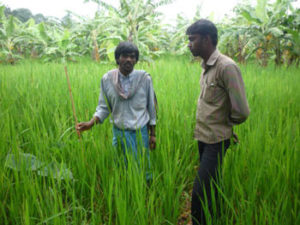
Extension staff visiting the field of a beneficiary
After a detailed survey in the dryland areas of Tamil Nadu, the Sendurai block in Dindigul district and the Jawadhu Hills in Tiruvannamalai district have been selected. Project activities were implemented in 13 villages covering 1237.46 acres. Detailed baseline survey along with the cost of cultivation for the area specific crops have been collected and documented. The beneficiaries of the project were grouped under 13 farmers’ sangams.
2. ORGANIC FARMING CERTIFICATION
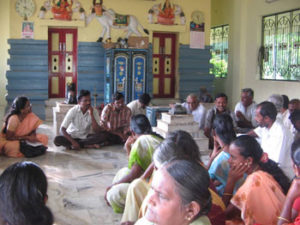
Our staff in discussion with beneficiaries
The entire land area selected under the project was registered with Tamil Nadu Organic Certification Department for organic farming certification. The farmers’ fields are being monitored continuously. Trainings were provided to the beneficiaries on record maintenance and standards to be followed in organic farming certification.
3. SAMPLE FARMERS
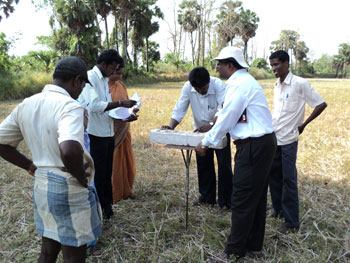
Analysis of soil health in the field of sample farmer
Under this project, 133 sample farmers have been selected from both the districts. Soil samples have been collected from their fields and analysed at our soil testing laboratory. Soil health was analysed through series of tests.
4. TRAININGS CONDUCTED FOR THE BENEFICIARIES
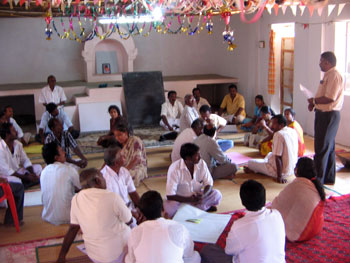
Analysis of soil health in the field of sample farmer
Under this project, training programmes on organic farming and related technologies have been conducted for the farmers of Dindigul and Thiruvannamalai districts. A total of 28 training programmes have been conducted for the beneficiaries. The participants were trained on the importance of organic farming and related technologies including organic certification and standards, soil health and analysis. Demonstrations of biopesticide preparation and compost production have also been done. The farmers were taken to visit the organic research farm of CIKS and briefed about the technologies implemented there. Following this audiovisuals on Composting, Biological pest control methods and Livelihood security were also screened.
5. TRAINING PROGRAMMES CONDUCTED FOR OTHER ORGANISATIONS
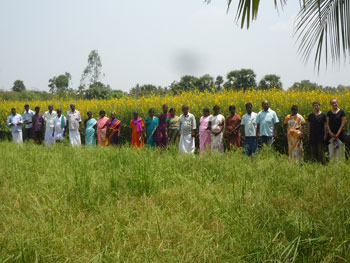
Farmers of other organisations in our experimental farm
Under this project, workshops and Trainers’ Training Programmes (TTPs) have been conducted for the farmers and representatives of other organizations.
- A total of two organic farming workshops of each four days have been conducted for the farmers and representatives of the NGO Hand in Hand in Kancheepuram district.
- A Trainers’ Training Programme on organic farming was conducted for the farmers working with the NGO NARDEP in Kanyakumari at the NARDEP training hall in Kanyakumari. The participants were trained in organic farming technologies, SRI method of paddy cultivation, global warming and organic cultivation packages for specific crops.
- A group of 133 students along with 8 teachers visited our organic research farm in Sukkankollai. They were briefed about the Principles and technologies of organic farming, importance and need of organic farming. They were taken to visit various organic farming technologies implemented in our farm.
6. STAFF CAPACITY BUILDING TRAINING PROGRAMMES
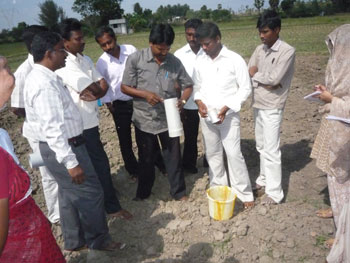
Practical sessions of the staff capacity building training on soil health analysis
- To enable the staff to execute the project activities effectively, a staff capacity building workshop was organized. A two day staff capacity building training programme on ‘Soil health and Nutritional analysis’ was conducted for the technical staff at the CIKS Technology Resource Centre in Sukkankollai. A total of 18 staff members participated in this training programme. This training programme was coordinated by Consultant, Mr. Daniel Anandraj. The participants were trained on various methods of analyzing soil health and nutritional status through class room sessions and a practical session.
- A two day training programme on Right to Information Act (RTI) has been conducted for the technical staff at CIKS Chennai office. Staff members were briefed about the act and its advantages. Practical session on drafting of RTI petitions has also been done.
7.EXPOSURE VISITS
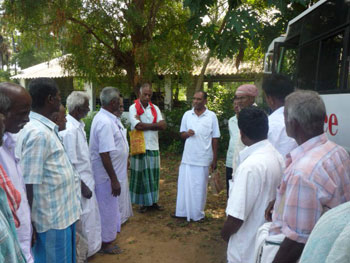
Farmers in discussion with an outstanding organic farmer Mr. Gomathynayagam
To expose the beneficiaries of the project to best practices of organic farming technologies, exposure trips were organised to organic farms and fields. A three-day exposure trip was organized. Selected beneficiaries were taken to visit the Bio – Fach organic fair held in Bombay between 18th and 20th November 2009 . After visiting the stalls in agri fair, farmers were also taken to visit the organic farms and fields in Pune and also had a detailed discussion with the farmers. Farmers learnt many organic farming technologies through this exposure trip.
8. PARTICIPATION IN TRAININGS / WORKSHOPS / AGRI FAIRS
-
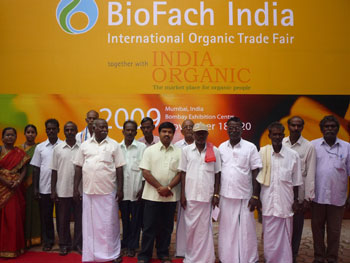
Staff and beneficiaries of CIKS participated in Bio Fach India trade fair
To build the capacity of the staff they were also attended many trainings and workshops.
- Two of our staff attended a training programme on “Implementation of Traceability for Organic Products” held in Hotel Heritage Inn, Coimbatore on 15th September 2009. The training was mainly focused on the web based updating of the details of the organic producers in an easily traceable system.
- Our staff along with two farmers attended the Agri Fair 2009 held in CODISSIA Complex in Coimbatore.
- We have visited the Bio – Fach India organic fair held in Bombay between 18 th and 20 th November 2009 . Farmers were also taken to visit the organic farms and fields in Pune.
- Our Programme Director attended a meeting on ‘Learning Impact Assessment of Organic Farming’ at Chennai.
9. ORGANIC FARMING FESTIVAL
Organic farming festivals were conducted in Kancheepuram, Thiruvannamalai and Dindigul districts.
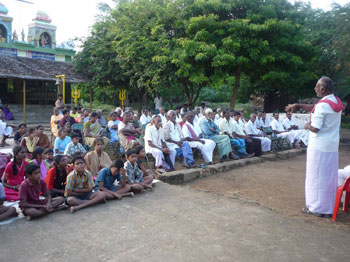
Participants of the organic farming festival conducted in Thiruvannamalai district
The main objectives of this festival are:
- To encourage the organic farmers.
- To create awareness in villages.
- To encourage and involve more number of farmers to do organic farming.
- To enhance the interests of sangam members towards organic farming.
- To develop unity among people in villages.
A total of 768 farmers participated in these functions. Chief gusts of the functions were Assistant Director of Agriculture, Agriculture Officers, Horticulture Officers, Bank Manager, sangam members and village Presidents.
